Paul Nelson - Interview Part 1
by Lisa Torem
published: 9 / 2 / 2015
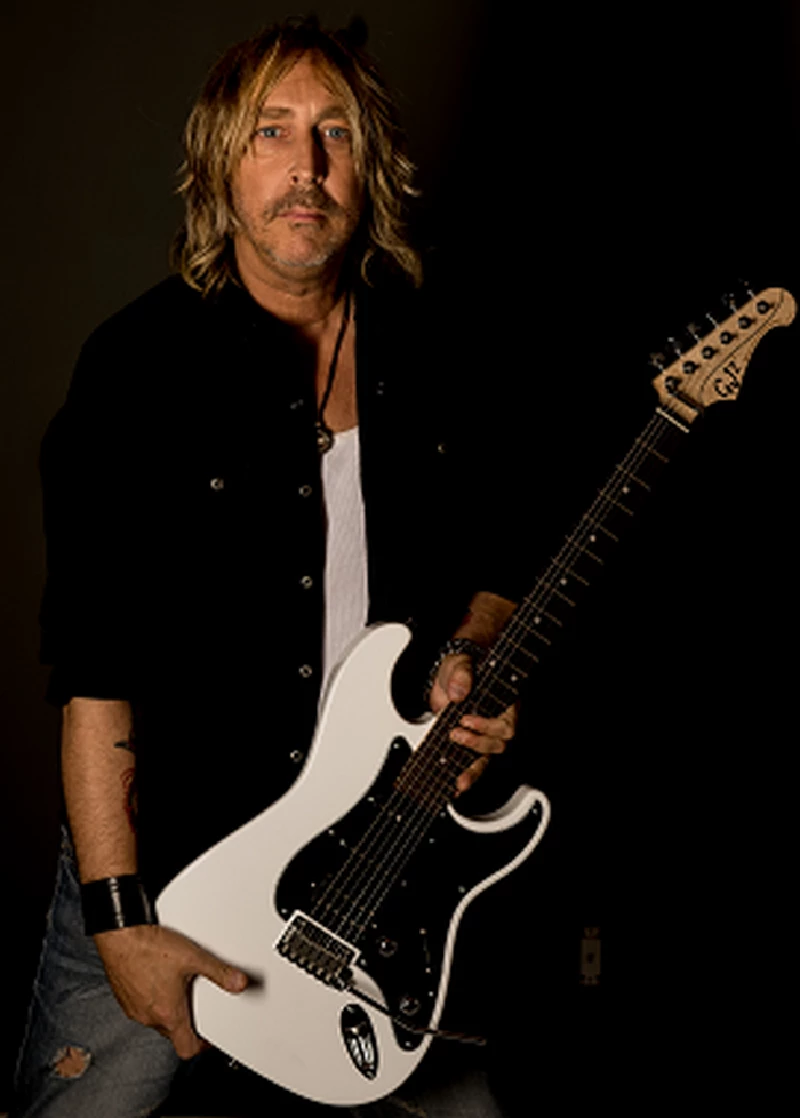
intro
In a two part interview Paul Nelson, the long-term guitarist and producer for Johnny Winter, who died last year, talks about his relationship with Winter and his posthumously released album, 'Step Back'
Guitarist Paul Nelson has recorded and performed with Los Lobos, Hubert Sumlin, Joe Walsh, Dickey Betts, Slash and countless other artists. Known for his ‘Master Class’ clinics, Paul is a sought-after speaker at NAMM. At Berklee College, Paul studied with Steve Vai, establishing a reputation as a genre-crossing composer and arranger. His 2001 solo EP ‘Look’ included ‘Full Blast’, which embraced bold, demonstrative riffs, and whilst ‘Complicated’ hinted at Joe Satriani, Nelson’s cocky, confident melodies and eclectic acuity, undeniably, served as the lynchpin. He played rhythm guitar on Johnny Winter’s 2004 album ‘I’m a Bluesman’, and also was the guitarist and the producer on Winter’s 2011 album ‘Roots’ and the posthumous ‘Step Back’, which came out in September of last year and won Best Blues Album at this year's 57th Grammy Awards Ceremony. Featured guests include Joe Perry, Billy Gibbons, Joe Bonamassa and Eric Clapton. The thirteen covers on it include songs made famous and/or written by Lightnin’ Hopkins, Howlin’ Wolf, Bo Diddley, Willie Dixon and Fats Domino. Sadly, Johnny Winter passed away on July 16, 2014, but Nelson, the longtime second guitarist for the Johnny Winter Band (with Scott Spray and Tommy Curiale) remains committed to keeping Johnny’s legacy visible via recordings and concerts. He also served as executive producer of ‘Johnny Winter: Down and Dirty’, directed by Greg Oliver which chronicled Johnny’s touring, fan relations and recuperation from substance abuse. In his second interview with Pennyblackmusic, Paul elaborates on his professional and personal relationship with Johnny Winter, the process of producing ‘Step Back’ and ‘Johnny Winter: Down and Dirty’, and his future plans. PB: I saw you in December at Buddy Guy’s Legends in Chicago when you, Tommy Curiale, Scott Spray of the Johnny Winter Band, and other artists gathered together to pay tribute to Johnny. How did you make this happen? PN: It was through Edgar (Winter, Johnny’s brother – LT). I’m friends with him through Johnny, and over the years I’ve played with him. When Johnny passed, this tribute had come about because Johnny was scheduled and we were scheduled to headline the rock and blues fest with Edgar. It almost got cancelled because of what happened, but then they turned it into a tribute so Edgar started doing Johnny’s songs with Rick (Derringer – LT)) and Kim Simmonds. He said, ‘Paul, I’d sanction these if you did these as well and I would play along with you at some of these events,’ and Buddy Guy’s was one of them, so I contacted him and said, “This is a big deal. They’re going to honour Johnny. They’re going to put his guitar on the wall and dedicate it to him and Buddy Guy is going to show up,” so he was in and then the other artists showed up. We have a list of artists that are called upon, depending on their area and availability, as we have now done several shows like this. Sonny Landreth has done a bunch. Mike Zito and Ronnie Baker Brooks had done some and then Earl Slick came out of nowhere (Laughs). I said, “Hey, man, do you want to sit in?’ ‘Yeah.’ So it developed into a thing. Originally, it was just going to be Edgar and I, and that was it. So I started making calls to see who was around to people who had done it before, and it turned into this show. They showed the movie first and then they recorded the whole show and now the hits on it are unbelievable. Everybody came to play; everybody came to pay respects, so it was a good night. Edgar sang a lot of the songs at Buddy Guy’s. He and I did ‘Tobacco Road’ together. We did that thing where he sings and I throw the riffs back at him, so that was pretty cool. We had done that a few times for other shows but it really clicked. He’s going to do more. PB: How do you keep the momentum going when you don’t play with some of these guys consistently? There’s a lot of onstage communication, isn’t there? PN: Some of them have done the show before and are familiar with it. Some of them have come to Johnny’s shows and they know the songs from the recordings, but the hardest part is to figure out who’s going to play what and for how long and to keep it equal so everybody gets their fair share and gets to shine in their own light, whether it’s honouring an artist or just being part of something. Yeah, there’s orchestration and making sure that as you announce that a person is ready to come out. There’s no time in between - dead air, as they say. That’s the hardest part. As far as playing, everybody knows these blues songs and has grown up on Johnny’s songs, and songs are picked for artists, such as we gave Ronnie Baker Brooks ‘Don’t Take Advantage of Me’. His father wrote it. He knew it and actually mentioned it, so he wailed on that one. But in general, musicians will ask what the key is and follow along. They use their ears if they’re not familiar with the changes, but they’ve played those styles growing up so much it is familiar territory. You’re dealing with amplifiers and different sounds and a different venue and they’re out of their own band’s element, but we try to make it as comfortable as possible. We’ve done a lot of these. When Johnny was around, I orchestrated a lot of guests to play with him. He wasn’t open to that in the beginning. He really wasn’t the kind of guy to have a lot of guests come out, but in the later years, he said, “You know I’m kind of getting into this and it’s great seeing these guys.” There were always these great stories backstage and hanging out. There’s a lot going on in front of the stage but in back of the stage… “Hey, how you doing”--connections are being made. “Boy, this was a great night, I enjoy your playing, and I’d love to have you on future albums.” These things, like Clapton’s ‘Crossroads’, spawn future albums, future bands, future line-ups; a multitude of things could come out of that. You never know who’s taking what card or what contact. PB: ‘Step Back’ was a follow-up to the 2011 album, ‘Roots’. You had planned to do a series of four albums altogether. PN: Yes, we were slated for two more. PB: Since Johnny had already handpicked so many of his favourite songs for the project, would you consider making a tribute album to him? PN: Actually, you just made me think of something, which I had never thought of. We did pick all of the songs for the new few albums because Johnny was so healthy - other than the emphysema that got him, he had a clean bill of health and the one thing we couldn’t fix was the emphysema. When you catch a cold, you catch a cold and he really got pneumonia and it just happened. The ironic thing is that prior to that we had sat in the tour bus and I had said, “You know, we have these two more records and we’re going to follow the same theme, because it’s working really well. You enjoy it, the fans love it, the songs are getting re-exposed to people and the guests are great. Why wait year after year? Why don’t we just pick all of the songs now and do it now?” And Johnny’s comment was, “Maybe we should, because you never know when some of these artists—how long they’re going to be around.” So he was talking about their longevity as if to say, “I’m going to be here, but you’re right, Paul. These other guys are getting older,” but he wasn’t planning on really going anywhere. He picked those but now what you’re saying - wow, that would be a tribute. That’s a great idea. Do the songs that Johnny had picked to do. That’s a new twist on the tribute idea. Usually you tribute songs that he’s already done, but that’s an interesting idea. We want to do a tribute album. There has never been one for Johnny. I’ve spoken with a lot of musicians and they’re like, “Wow. There hasn’t been.” PB: The format of ‘Step Back’ was unique. Johnny took the first solo on most songs, and then a guest followed up with the second solo, which led to some nice chemistry. PN: All I had to do as a producer was make it his album, but at the same time, make it a nice, comfortable setting for the other guests. The hardest part was organizing that because of the tour schedule. A lot of artists didn’t come to the studio and some sent in their stuff. That was really an odd thing because when you send in music from other places and studios it’s detectable on the recording. There’s a sound of being in the same room, and Johnny was a big lover of everybody in the same room. The fact that Johnny assigned the producer job to me was a huge honour, but I guess he trusted me enough and knew that I knew his playing, and trusted my playing and that I would make it comfortable for him so he could sit back and do his thing, which is really cool because it’s hard to produce yourself while doing that. When the music comes in, usually they plop it on and then you hear a different sound in the room. You know it’s thrown in - you know it from the type of record it is, but I wanted to make sure that it wasn’t like that. so I had the engineers that were recording each artist contacted. I said, “I need a list of how you mic’ed them, what size room, what type of amps and what kind of effects so when you send in your tracks I’ll emulate that sound: the studio, the room, the mics, to make it sound as if they did play here.” I took that extra step rather than just plop it down and say, “Thank you very much. Connect this and edit it.” It’s like when someone is making a painting and they start drawing the little pine tree and then they draw the lake and the mountain and they get that final brush and put it over the whole thing and all of a sudden it just pops. That’s what it’s like. It’s the same thing. It’s like a painting. You have to make it sound like it was all done there. First, you have to do all of these individual parts, but then all of a sudden the album starts developing. You start thinking about song order. Are there two harp players in a row, are the keys the same, and are the tempos the same? There’s a lot going into that. And then the guests—all the guests play after Johnny and then they submit little fills; the little ear candy, the riffs behind the vocals, the little guitar lines. With Clapton, for example, those are separated. So it’s Johnny, then Clapton, then Johnny, then Clapton. Everyone. And you have to count. Clapton got eight, Johnny got eight, because you’re dealing with these big names and you want to do them justice and at the same time it’s Johnny’s album and you don’t want to over shadow him, but Johnny was quite healthy and it came out great and no one said no. The hardest part was setting up the schedules. PB: I imagine even more artists wanted to be on that album. Did you turn anyone away? PN: The phone was ringing off the hook, but we knew we had two more to go so we thought we’d get them on the next one. And then the songs—Johnny picked the songs and then I picked the artists who would do the songs best. Like Dr. John on ‘Blue Monday’ - it just makes sense. It’s a piano song. Like Clapton on ‘Bobby Blue Bland’. He grew up listening to that. He said in articles how much he loved that and it was perfect with Johnny. So another thing is making sure that the artist matched the song, so then the rhythm section had to be notified. I made sure that they learned the songs from the original versions and then other versions of it so when they did the rhythm parts, we’re playing stuff from some heavyweights. PB: When you say the original songs, you mean going back to, for example, the Gatemouth Brown version? PN: Yes, the absolute original versions. And when we went back to Johnny, we could communicate that to him and he’d say, “Yeah, did you hear that part? I listened to that when I was a kid.” And so we played it, giving that justice and then “winterized it”—modernized it a little bit so it wasn’t old, old stuff but it still paid tribute. At the same time we had to say, “Billy Gibbons is coming in so let’s give it a little ZZ Top twist.” But you have to know the original first to change it from what it is, otherwise you don’t know what you’re changing it from - you have no reference point. PB: So ‘Step Back’ was a very in-depth project, which took into account, history, culture and the passing of the baton. As you said, there was a lot going on. PN: Right. And I had a system. I kept track of everything. PB: Johnny did one solo called ‘Death Letter’. PN: You know, when you get the chill down the spine, when you hear something and you feel hair sticking up on the arm? It was one of those moments. We knew that this was historic because he sounded like Son House, paying homage, and you could tell that he studied Son House by what was coming out because it was exact to the song as far as paying tribute to specific riffs and stuff, but at the same time it was Johnny, and it was like, “Oh, my God, this is just historic” and he hadn’t played a solo song—this was another sign that he was healthier—he was older, but at 70 he fit right into the song. His age, his voice, the timbre, it was fitting the style of the song perfectly and it was done in one take and it’s a long song. PB: And it was a very powerful vocal. PN: Absolutely, but there was some very intricate stuff going on there. It’s singing. I’m in the booth going, “Oh, my God.” And the camera was rolling because the documentary guy, Greg Oliver, was there. I said, “Did you get that?” He goes, “Yep.” And that’s in the movie. And that’s how the promotional version of the trailer came out. It was just one of the moments. It’s ironic. It was one of those twists of fate that it ended up being the title of the song that it is, with that word in it. We weren’t thinking of it at that time, but then everyone says, “Oh, he sang that song. He must have known,” but there was no mystique behind it. It’s just he hit it out of the park. PB: Johnny had such amazing recall for these artists from other eras and their performance styles. PN: It’s unbelievable. His brain was full of lyrics. He could recite television theme songs. He knew the words to ‘The Fresh Prince of Bel Air’ because he had that routine of words and words. It’s an instrument in itself. PB: How was your experience with Joe Perry? PN: He was contacted. He called me up and said, “Paul, I just wanted to let you know that this was a huge honour. You have no idea what this meant to me.” I said, “I know, everybody listened to Johnny.’ He said, “No. You don’t understand. I wouldn’t have picked up the guitar if it weren’t for him. I had a Firebird. I listened. It was him.” So he was totally honoured. The nicest guy—he submitted a solo and it was great. PB: You played throughout, but you especially raised the bar on ‘Killin’ Floor’. PN: Thanks. Johnny threw me my own section as he did with the last one. That’s a huge honour. Just playing with Johnny would have been enough for me forever, but he took me under his wing and showed me all this stuff and he was my best friend and teacher. He was like a father to me. He called me his son He said, “Paul, I want you to play on this, not only on the tracks, but I want you to solo. I appreciate your playing and I want people to know. You got that track,” and I said, “Cool.” I used to play that song live. More information can be found at www.paulnelsonguitar.com. The top photograph was taken by Michael Weintrob while the other four photographs were provided by publicist John Lappin.
Article Links:-
http://en.wikipedia.org/wiki/Johnny_WinterBand Links:-
http://paulnelsonguitar.com/https://en-gb.facebook.com/The-Paul-Nelson-Band-1519832368337964/
https://twitter.com/paulnelsonguit1
Picture Gallery:-
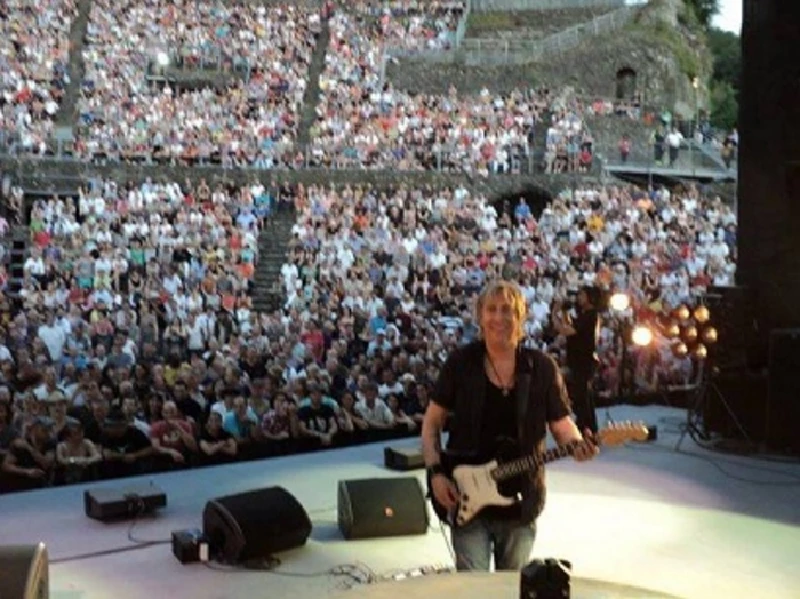
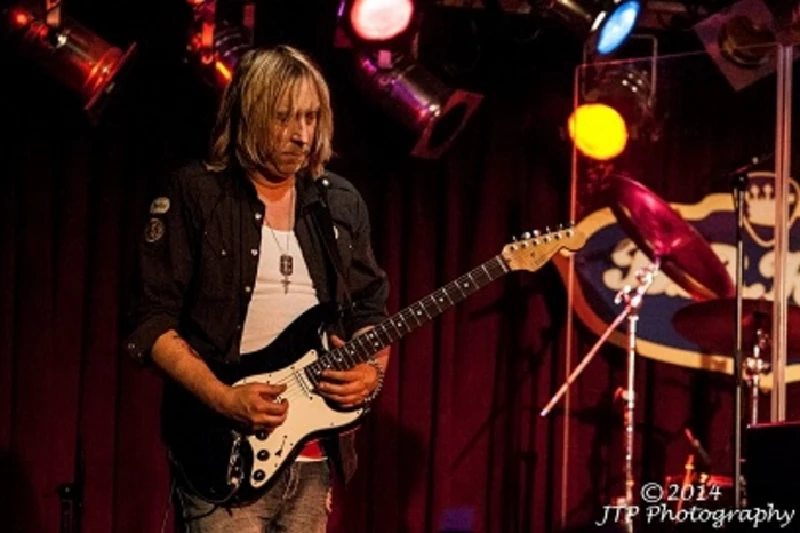
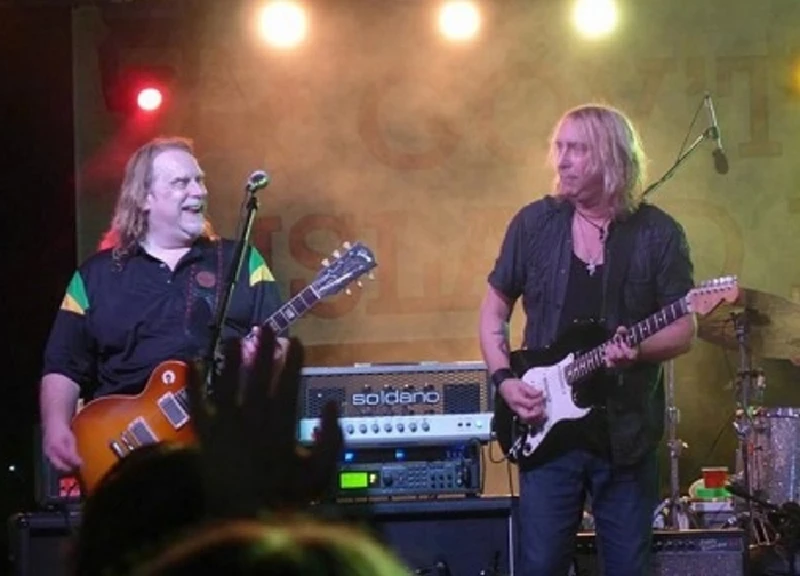
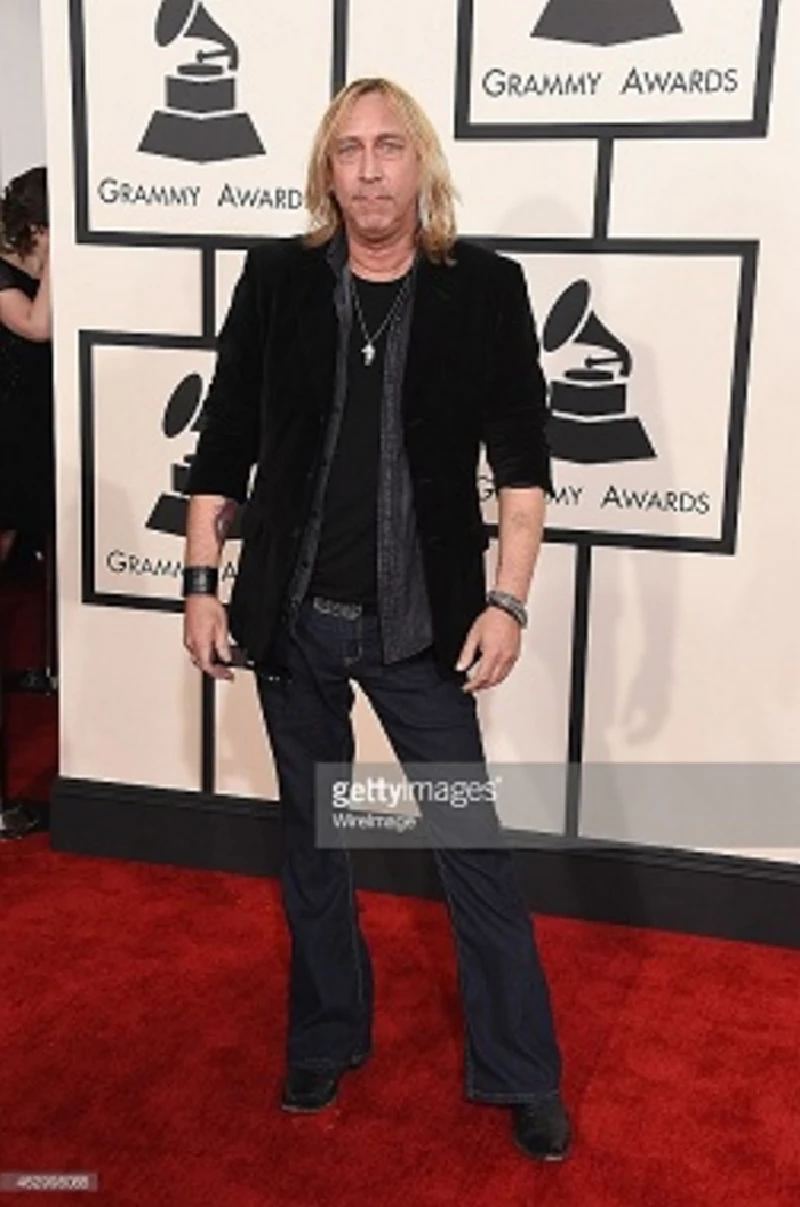
Visitor Comments:- |
| 740 Posted By: lisa torem, chicago on 23 Feb 2015 |
|
Thanks for getting in touch, David.
Cheers,
Lisa
|
| 735 Posted By: david English , Cartegena Colombia on 12 Feb 2015 |
|
must have been great to be in the studio with a talent like J w. Love the stories. Cheers
|
interviews |
|
Interview (2017) |
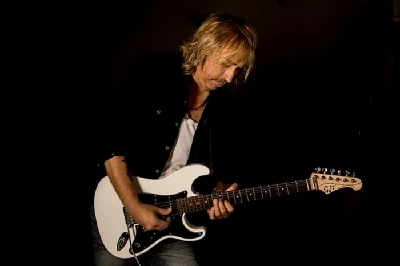
|
| American producer, arranger and guitarist and foremer Johnny Winter manager Paul Nelson talks with Lisa Torem about 'Badass Generation, his band’s debut album |
| Interview Part 2 (2015) |
| Interview (2010) |
most viewed articles
current edition
Carl Ewens - David Bowie 1964 to 1982 On Track: Every Album, Every SongBathers - Photoscapes 1
Visor Fest - Valencia, Spain, 26/9/2025...27/9/2025
Colin Blunstone - Thalia Hall, Chicago, 16/7/2025
Sir Tim Rice - Interview
John McKay - Interview
Editorial - July 2025
Armory Show - Interview with Richard Jobson
Billie Eilish - O2 Arena, London, 10/7/2025
Bathers - Photoscapes 2
previous editions
Heavenly - P.U.N.K. Girl EPTrudie Myerscough-Harris - Interview
Pixies - Ten Songs That Made Me Love...
Beautiful South - Ten Songs That Made Me Love...
Oasis - Oasis, Earl's Court, London, 1995
Boomtown Rats - Ten Songs That Made Me Love....
Simon Heavisides - Destiny Stopped Screaming: The Life and Times of Adrian Borland
Prolapse - Interview
Blues and Gospel Train - Manchester, 7th May 1964
Paul Nelson - Interview
most viewed reviews
current edition
Amy Macdonald - Is This What You've Been Waiting For?Sick Man of Europe - The Sick Man of Europe
Alice Cooper - The Revenge of Alice Cooper
Phew, Erika Kobayashi,, Dieter Moebius - Radium Girls
Lucy Spraggan - Other Sides of the Moon
Blueboy - 2
Cynthia Erivo - I Forgive You
Davey Woodward - Mumbo in the Jumbo
Lapsley - I'm a Hurricane, I'm a Woman In Love
Philip Jeays - Victoria
Pennyblackmusic Regular Contributors
Adrian Janes
Amanda J. Window
Andrew Twambley
Anthony Dhanendran
Benjamin Howarth
Cila Warncke
Daniel Cressey
Darren Aston
Dastardly
Dave Goodwin
Denzil Watson
Dominic B. Simpson
Eoghan Lyng
Fiona Hutchings
Harry Sherriff
Helen Tipping
Jamie Rowland
John Clarkson
Julie Cruickshank
Kimberly Bright
Lisa Torem
Maarten Schiethart